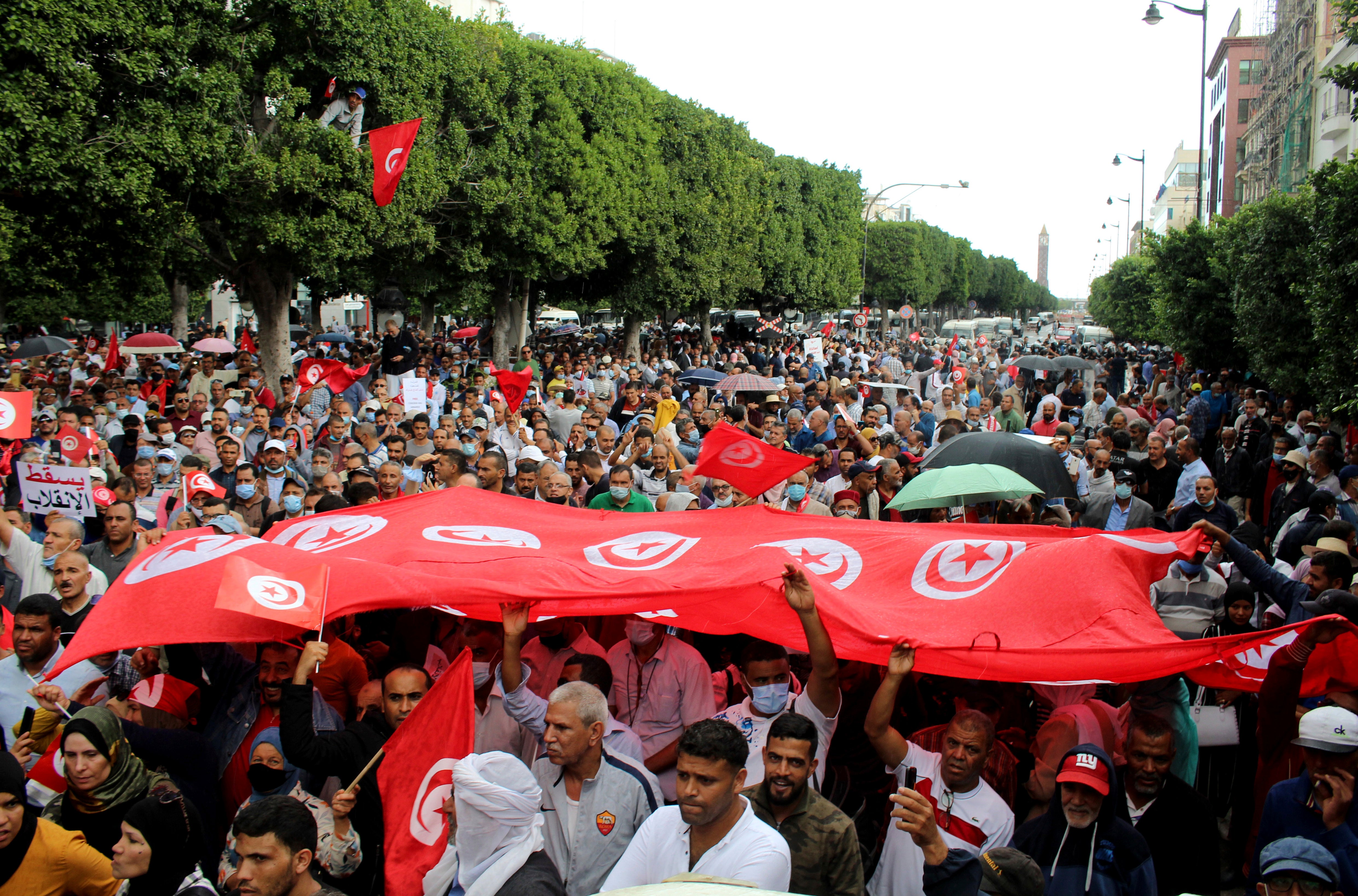Tunisia protest shows rift over president's seizure of power
Several thousand demonstrators gathered in central Tunis to protest President Kaïs Saied’s recent consolidation of power, which his critics have called a coup

Your support helps us to tell the story
From reproductive rights to climate change to Big Tech, The Independent is on the ground when the story is developing. Whether it's investigating the financials of Elon Musk's pro-Trump PAC or producing our latest documentary, 'The A Word', which shines a light on the American women fighting for reproductive rights, we know how important it is to parse out the facts from the messaging.
At such a critical moment in US history, we need reporters on the ground. Your donation allows us to keep sending journalists to speak to both sides of the story.
The Independent is trusted by Americans across the entire political spectrum. And unlike many other quality news outlets, we choose not to lock Americans out of our reporting and analysis with paywalls. We believe quality journalism should be available to everyone, paid for by those who can afford it.
Your support makes all the difference.Several thousand demonstrators gathered in central Tunis on Sunday to protest President Kaïs Saied’s recent consolidation of power, which his critics have called a “coup."
The protest reflected an increasingly visible rift in Tunisian society over the president's actions. Police presence was visibly bolstered for the demonstration, and scuffles were reported on the sidelines as protesters tried to overcome barriers erected on Bourguiba Avenue, the city's main thoroughfare. A journalist for state-run television was hospitalized after being hit with rocks and water bottles thrown by angry protesters.
Saied abruptly dismissed the prime minister, assumed all executive powers and froze the parliament following nationwide antigovernment protests July 25. He said he was seeking to save the country from a deteriorating economic, political and heath crisis. Last month he gave himself the power to rule by decree and partially suspended the 2014 constitution.
Saied’s actions have proved widely popular among those who see him as a corruption fighter taking on the country's much-hated political elites. But others are concerned his actions signal a return to the autocracy Tunisians revolted against in 2011, igniting what would be known as the Arab Spring.
In recent weeks, thousands of Tunisians have staged tit-for-tat demonstrations each weekend. This Sunday, the crowd was predominantly made up of middle-aged men and women, many of them supporters of Tunisia’s Islamist parties which have been sidelined by Saied’s measures.
Raja Masmoudi, a teacher at Sunday’s demonstration, told The Associated Press that she didn’t want to see Tunisia return to a dictatorship.
“The future in Tunisia is really scary to me. For now, we don’t know what we will have as institutions. We don’t have a parliament, we don’t have democracy in our country," she said.
“Save our democracy!”, “The people want the removal of the President!”, read several placards. One woman held a sign that read “Ever seen a president calling his people insects?”, referring to Saied’s speech on Saturday in which he called Sunday’s demonstrators “insects” and “devils.”
Demonstrator Gharbi Rebha said that she was worried about Saied’s divisive rhetoric and said that the president should encourage his people to unite, rather than fight each other.
Rebha voted for Saied in the 2019 elections, which saw him win by a landslide – and she now feels betrayed.
“I worked to convince my neighborhood to vote for him… I told them ‘you should vote for Saied, he’s clean, this one is better.’ You can’t imagine what I did for him, I was even canvassing for him at night! When he won I brought cakes to my neighbors.”
Demonstrator Mohamed Souhail, a 63-year-old engineer, called for mass civil disobedience to counter Saied’s consolidation of power.
Interior Ministry spokesman Khaled Lahyouni said the heavy police presence was aimed at “ensuring the safety of the demonstrators.”
Amer Ayed, an anchor at Al Zitouna TV channel, was arrested last week after he criticized Saied and recited an anti-dictatorship poem on air. A military investigation has charged him with “plotting against state security” and “committing a heinous act against the president of the republic,” among other charges.
Al Zitouna also had its equipment confiscated by the authorities. Tunisia’s communication authority, HAICA, says this was because the channel was illegally operating without a license.